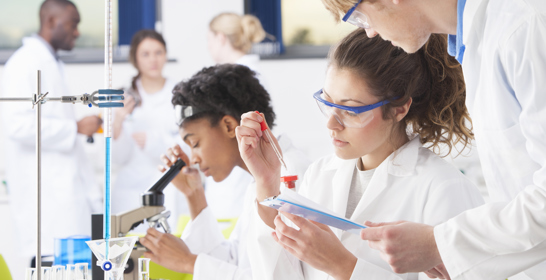
Don’t miss out on new resources
Please join us as we – together with our partners – chart new paths toward a healthier world. Sign up for our newsletter today.

FLRF and the International Society for Research in Human Milk and Lactation (ISRHML) are helping cultivate the next generation of researchers in human milk and lactation with the next generation of their Trainee Expansion Program – TEP 2.0.
TEP 2.0 offers a total of USD $1.25 million over five years, through two types of annual grant, to academics seeking to enter or advance a career in human milk and lactation.
TEP 2.0 builds on the success of the inaugural initiative, which awarded over 30 grants since launching in 2016. ISRHML and FLRF aim to make TEP 2.0 more accessible and expand its reach by:
Are you interested in furthering your career, acquiring a new skill set or expanding your professional network to another lab or country ... or does this sound like someone you know?
Discover more at www.tepgrants.org: Applications open annually 1 August. The deadline to apply is 1 October.
Creating new learning opportunities is one way to take action toward fulfilling the Sustainable Development Goals on education and maternal and child health.
Meet previous TEP awardees in the Hall of Fame: 2016-Summer 2020. These TEP Bridge Fund and TEP Travel Fund awardees each received up to USD $100,000 or up to USD $10,000 respectively to advance in their academic career.
Read the press release (English).
Read the press release (German).
Esquerra-Zwiers A, Vroom A, Geddes D, Lai CT. Use of a portable point-of-care instrumentation to measure human milk sodium and potassium concentrations. Breastfeed Med [Internet]. 2022;17(1):46–51. DOI: 10.1089/bfm.2021.0046
George AD, Burugupalli S, Paul S, Mansell T, Burgner D, Meikle PJ. The role of human milk lipids and lipid metabolites in protecting the infant against non-communicable disease. Int J Mol Sci. 2022;23(14):7490. DOI: 10.3390/ijms23147490
Gridneva Z, George AD, Suwaydi MA, Sindi AS, Jie M, Stinson LF, et al. Environmental determinants of human milk composition in relation to health outcomes. Acta Paediatr [Internet]. 2022. DOI: 10.1111/apa.16263
George A, Gay M, Selvalatchmanan J, Torta F, Bendt A, Wenk M et al. Healthy Breastfeeding Infants Consume Different Quantities of Milk Fat Globule Membrane Lipids. Nutrients. 2021;13(9):2951. DOI: 10.3390/nu13092951
Huang W, Cho KY, Meng D, Walker WA. The impact of indole-3-lactic acid on immature intestinal innate immunity and development: a transcriptomic analysis. Sci Rep. 2021;11(1):8088. DOI: 10.1038/s41598-021-87353-1
Gao Y, Davis B, Zhu W, Zheng N, Meng D, Walker WA. Short-chain fatty acid butyrate, a breast milk metabolite, enhances immature intestinal barrier function genes in response to inflammation in vitro and in vivo. Am J Physiol Gastrointest Liver Physiol. 2021;320(4):G521–30. DOI: 10.1152/ajpgi.00279.2020
Zheng N, Gao Y, Zhu W, Meng D, Walker WA. Short chain fatty acids produced by colonizing intestinal commensal bacterial interaction with expressed breast milk are anti-inflammatory in human immature enterocytes. PLoS One. 2020;15(2):e0229283. DOI: 10.1371/journal.pone.0229283
Meng D, Sommella E, Salviati E, Campiglia P, Ganguli K, Djebali K et al. Indole-3-lactic acid, a metabolite of tryptophan, secreted by Bifidobacterium longum subspecies infantis is anti-inflammatory in the immature intestine. Pediatr Res. 2020 Jan 16. DOI: 10.1038/s41390-019-0740-x. [Epub ahead of print]
Senger S, Ingano L, Freire R, Anselmo A, Zhu W, R Sadreyev et al. Human fetal-derived enterospheres provide insights on intestinal development and a novel model to study Necrotizing Enterocolitis (NEC). Cell Mol Gastroenterol Hepatol. 2018 Jan 31;5(4):549-568. DOI: 10.1016/j.jcmgh.2018.01.014. eCollection 2018.
Jiang F*, Meng D*, Zhu W, Weng M, Kasper DL, Walker WA. The symbiotic bacterial surface factor polysaccharide A on bacteroides fragilis Inhibits IL-1 β-induced inflammation in human fetal enterocytes via toll receptors 2 and 4. Plos One. 2017;12(3):e0172738. DOI: 10.1371/journal.pone.0172738. eCollection 2017. (*shared authorship)
Gregory KE*, Samuel BS*, Houghteling P, Shan G, Ausubel FM, Sadreyev RI et al. Influence of maternal breast milk ingestion on acquisition of the intestinal microbiome in preterm infants. Microbiome. 2016;4(1):68. DOI: 10.1186/s40168-016-0214-x. (*shared authorship)
Walker WA, Iyengar RS. Breast milk, microbiota and intestinal immune homeostasis. Pediatr Res. 2014;77(1-2):220-228. DOI: 10.1038/pr.2014.160. Epub 2014 Oct 13.
Jeurink PV, van Bergenhenegouwen J, Jiménez E, Knippels LM, Fernández L, Garssen J et al. Human milk: a source of more life than we imagine. Benef Microbes. 2013;4(1):17-30. DOI: 10.3920/BM2012.0040.
Chichlowski M, De Lartigue G, German JB, Raybould HE, Mills DA. Bifidobacteria isolated from infants and cultured on human milk oligosaccharides affect intestinal epithelial function. J Pediatr Gastroenterol Nutr. 2012;55(3):321-327. DOI: 10.1097/MPG.0b013e31824fb899.
Schwartz S, Friedberg I, Ivanov IV, Davidson LA, Goldsby JS, Dahl DB et al. A metagenomic study of diet dependent interaction between gut microbiota and host in infants reveals differences in immune response. Genome Biol. 2012;13(4):R32. DOI: 10.1186/gb-2012-13-4-r32.
Rautava S, Walker WA. Academy of Breastfeeding Medicine founder’s lecture 2008: Breastfeeding – An extrauterine link between mother and child. Breastfeed Med. 2009;4(1):3-10. DOI: 10.1089/bfm.2009.0004.
Check here to search for open access research findings published by our partners.